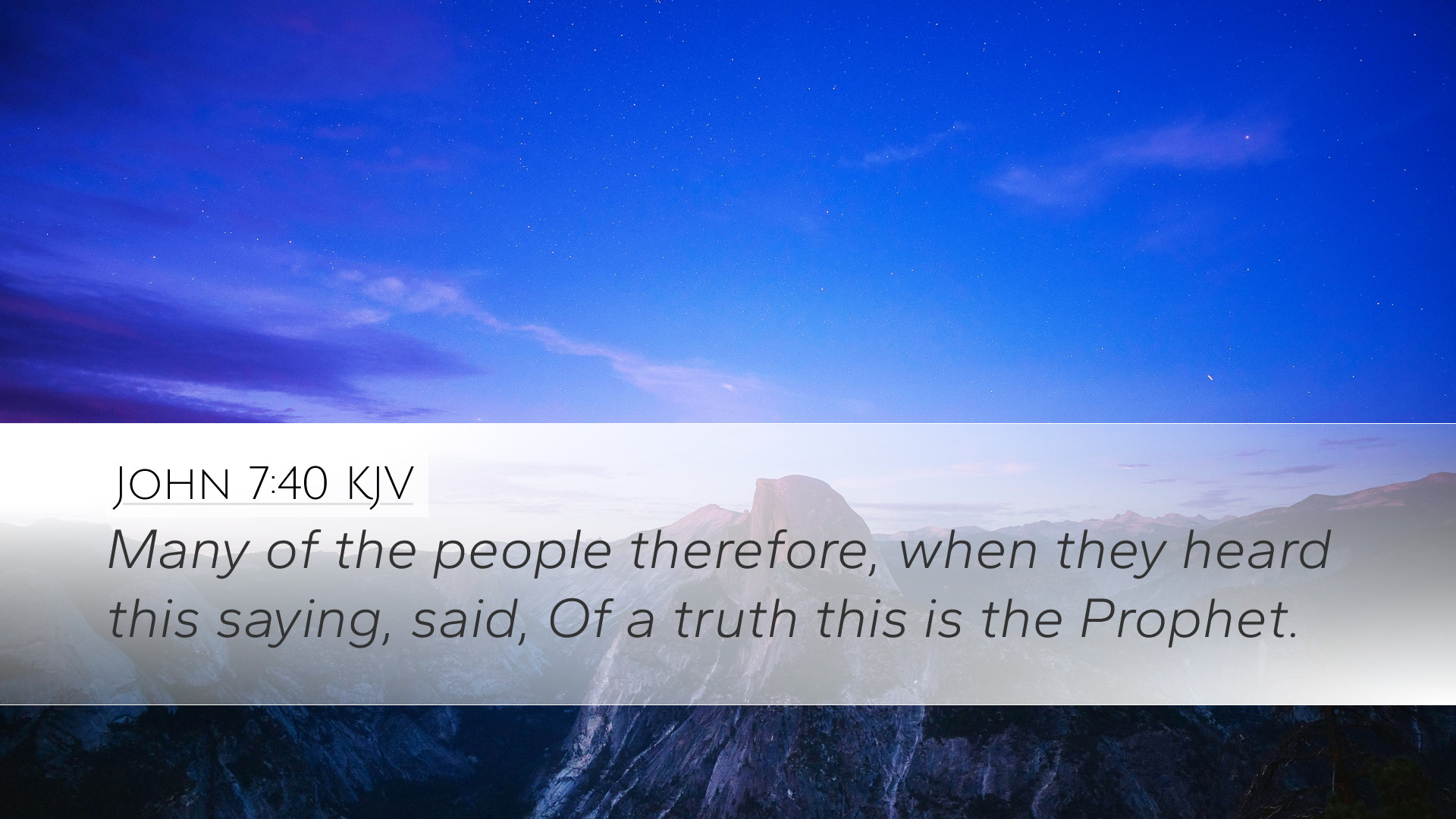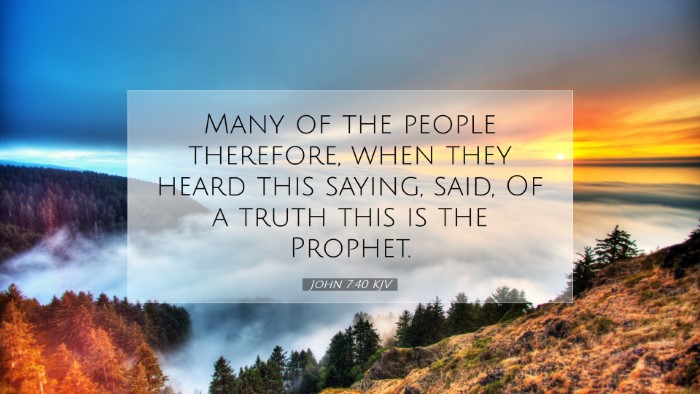Commentary on John 7:40
John 7:40 states: "Many of the people therefore, when they heard this saying, said, ‘Of a truth this is the Prophet.’” This verse occurs in the context of a debate about the identity of Jesus, the authenticity of His message, and the expectations of the Jewish people regarding the Messiah. Various public domain commentaries provide valuable insights into this passage, encouraging deep theological reflection.
Contextual Overview
In understanding John 7:40, it is crucial to recognize the broader narrative that encompasses the Feast of Tabernacles. This feast was a significant event in Jewish tradition, filled with spiritual symbolism and anticipations. The public discussions about Jesus reflect the diverse opinions surrounding His identity—some students of Scripture perceived Him as a prophet, while others grappled with the implications of His claims.
Insights from Matthew Henry
Matthew Henry emphasizes the significance of Jesus as the Prophet mentioned in Deuteronomy 18:15. He writes that the people's acknowledgment of Jesus as the Prophet points to their awareness of prophetic expectations within their culture. Henry further elucidates the duality in the crowds’ responses; while some believed in Jesus as the prophet, others remained skeptical. This distinction showcases the varied degrees of faith and understanding among the people.
Interpretation of "The Prophet"
Henry points out that when the people refer to Jesus as "the Prophet," it connects to their long-standing hope for a figure who would be like Moses, a divinely appointed leader who would guide Israel. This title reflects their recognition of Jesus as a significant religious leader, albeit with varying understandings of His authority and role.
Insights from Albert Barnes
Albert Barnes provides an analysis of the phrase "of a truth," which conveys a sense of conviction among the people. According to Barnes, this expression indicates that those speaking are not merely making a superficial declaration; rather, they express a profound realization about Jesus' identity. He notes that the title "the Prophet" implies the fulfillment of Messiah prophecies, thus laying a foundation for deeper theological explorations.
Theological Implications of Claiming Jesus as the Prophet
Barnes delves into the implications of recognizing Jesus as the Prophet. This acknowledgment signifies a movement toward faith, implying that Jesus is worthy of belief and warrants further inquiry into His teachings. However, Barnes also raises the question of whether this recognition will necessarily lead to genuine faith in Jesus as the Messiah. The danger of intellectual acknowledgment without heart commitment is critiqued through the lens of this passage.
Insights from Adam Clarke
Adam Clarke extends the discussion on the differences in opinion among the people. He highlights that some perceived Jesus merely as a prophet, while others believed Him to be the promised Messiah. Clarke underscores the necessity of faith in recognizing Jesus in His full glory as both prophet and Savior, stressing that many in the crowd missed the deeper truth of who Jesus was and what He came to accomplish.
The Importance of Faith
Clarke's commentary emphasizes the distinction between acknowledgment and belief. He warns that to merely recognize Jesus as a prophet without accepting Him through faith ultimately leads to spiritual blindness. Such introspection invites readers, particularly theologians and pastors, to assess their own faith journey and understanding of Christ, drawing attention to the essence of discipleship and true belief.
Conclusion
In summary, John 7:40 serves as a pivotal moment in the debate concerning Jesus' identity. Through the insights of Matthew Henry, Albert Barnes, and Adam Clarke, one can apprehend the multilayered reactions of the people toward Jesus. The designation of Jesus as "the Prophet" invokes themes of prophetic fulfillment, the nature of faith, and the challenge of fully recognizing Jesus in His divine mission.
This verse invites pastors, students, and scholars alike to consider how they respond to the identity of Jesus in their faith journeys. The responses of the crowd challenge believers today to move beyond mere acknowledgment and pursue a deeper relationship with Christ, recognizing Him not only as a prophet but as the embodiment of God's promises and the source of eternal life.


